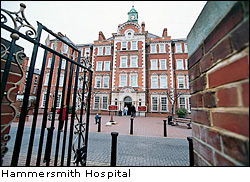New Cardiac Labs Opened at Hammersmith Hospital
Launch is "bright day for people at risk of heart disease "
Professor Sir Bruce Keogh, national medical director of NHS England, officially opened two cardiac catheter laboratories, or cath labs, at Hammersmith Hospital on July 9.
Hammersmith Hospital is managed by Imperial College Healthcare NHS Trust and Sir Bruce was welcomed by Trust chief executive Mark Davies, chairman Sir Richard Sykes and medical director Professor Nick Cheshire.

Sir Bruce then toured the hospital’s cardiology services before officially opening the Augustus Waller Department of Electrophysiology, which consists of a five-lab suite including the two new labs, which were built with a £2.5 million investment.
In his role at NHS England, Sir Bruce is responsible for clinical quality, policy and strategy and postgraduate education. A former cardiothoracic surgeon at Hammersmith Hospital in the 1990s, he thanked an audience of 80 staff and visitors for the invitation to open the labs.
Sir Bruce said: " The cardiology service at Hammersmith Hospital has a fantastic heritage and a great future thanks to the Trust's ambition and academic leadership.
" The Trust is in good financial shape and this will help to develop services while, part of an academic health sciences centre, the department will be able to conduct important trials and be involved in translational research for the benefit of patients."
The official opening marks the completion of a project to create a five-lab suite to improve quality of care, research and patient experience, as well as operational and financial efficiency.
The department is named after Augustus Waller, a professor of physiology at St Mary’s Hospital whose research led to the development of the electrocardiograph or ECG, a test which records the heart’s electrical activity
The Trust says the new cath labs are part of a consolidation of all the Trust’s cardiology services in a specialist unit on a single site at Hammersmith Hospital and involved the re-location of the electrophysiology department from St Mary’s Hospital, Paddington.
The unit offers a full range of investigations and treatments of heart conditions and includes a 24/7 heartattack centre, cardiac day ward, clinical investigations centre, and theatres for cardiothoracic surgery.
Other treatments include TAVI, a less invasive form of aortic valve replacement to treat a narrowed heart valve, and minimally invasive closure of holes in the heart with umbrella devices.
Dr Kevin Fox, a consultant cardiologist and the Trust’s chief of service for cardiology, said the opening represented a "bright day for people who are at risk of heart disease in northwest London.
"
We are able to care for these patients day or night," he said. " We have created a hub for acute cardiac care in northwest London, linking a fantastic Imperial College London research facility to clinical care on the same site.
" Working in partnership with London Ambulance Service, we uniquely in northwest London offer 24/7 care for people whose heart is beating life threateningly fast or slow, whose heart arteries are blocked or whose heart muscle is failing."
Dr Fox also thanked the large multi-disciplinary team which cares for cardiac patients, including nurses, physiologists, cardiologists and a range of other support staff. He added:"The cath labs will not only focus on treatment but also prevention.
" In these new labs we will insert preventive defibrillator devices to keep patients alive and help them live a longer fulfilling life for them and their families."
July 19, 2013
Related links
|
